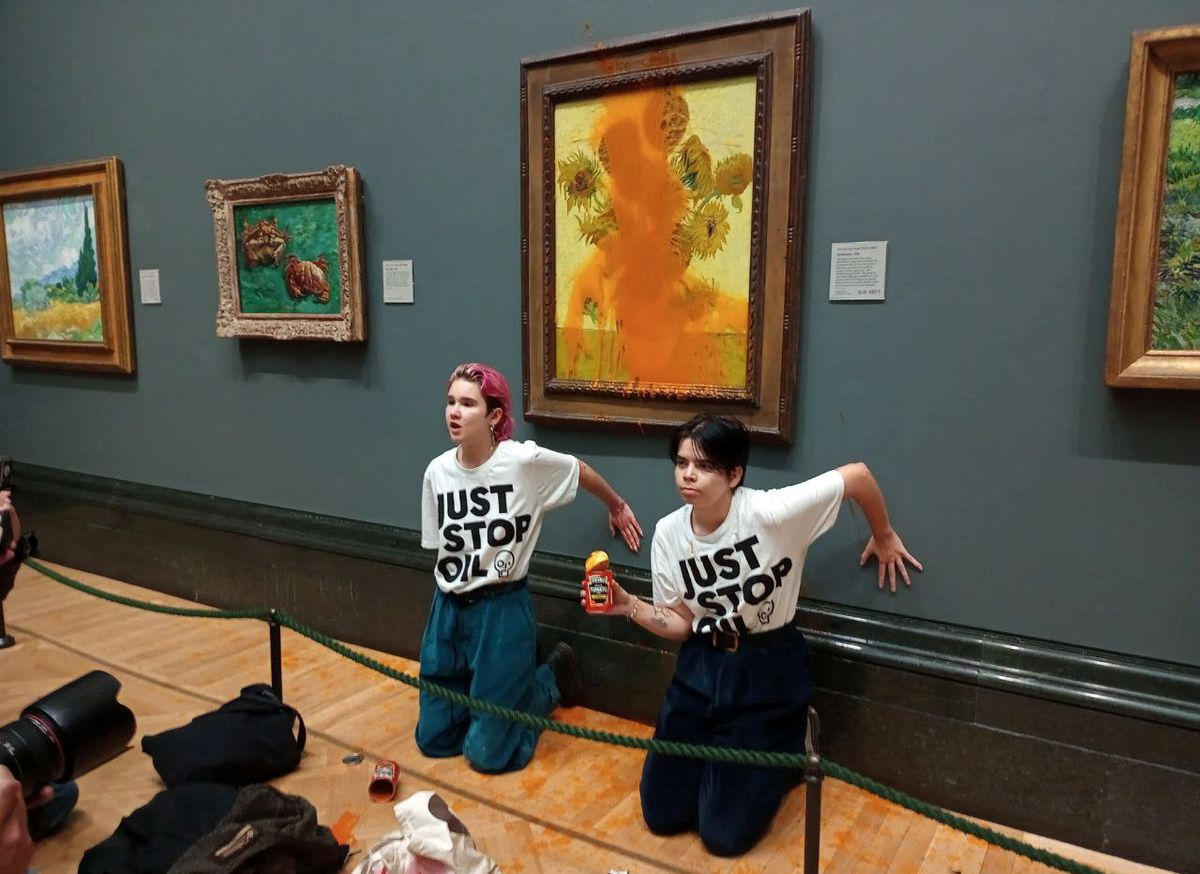Is there a right way to protest?
The protesters who threw tomato soup at Vincent Van Gogh’s Sunflowers were charged with criminal damage. (Photo: Reuters)
Activists from Just Stop Oil threw canned soup at Vincent Van Gogh’s famous Sunflowers painting and glued themselves to the wall of the London National Gallery on October 14. Earlier this year, a man smeared cake and lipstick on the Mona Lisa in the Louvre in Paris. Both incidents had ties to environmental messaging of saving the Earth amid the global climate crisis. Neither painting was damaged.
“What is worth more, art or life? Are you more concerned about the protection of a painting or the protection of our planet and people?” one of the Just Stop Oil protesters, Phoebe Plummer, said. In an interview, Plummer said that they knew the painting was protected and that they wouldn’t have thrown tomato soup at it if it wasn’t or if any damage was irreversible.
The point, according to Plummer, was to start a conversation.
Looking for attention
Protests are often driven by the need to be heard and the desire for change, and most people are onboard with that need. The ways we get there however are where roads tend to diverge.
For some, making your voice heard means going through bureaucratic means: writing petitions, letters, and emails to officials, and voting. It’s usually the first and most generally accepted course of action. But when it becomes clear that people aren’t paying attention, we turn to more disruptive protests.
There are boycotts like what happened to Jollibee and Shopee after labor, employment, or marketing issues emerged. Strikes and walkouts threaten to disturb operations in workplaces or schools. Stunts like the Just Stop Oil protests interrupt the daily ho-hum of life to send a message.
In the Philippines, the most familiar form of protests are marches and rallies. Our most famous protest was the 1986 People Power, or EDSA I, which was hailed as a landmark of peaceful revolution. There’s a fondness for EDSA I as a sign that nonviolence can send a powerful message in itself, without a need for pillaging or destruction.
But history has proven that it takes radical and sometimes intense action for powerful institutions to even bat an eye.
Take the Black Lives Matter movement in the US, which was at its loudest after the murder of George Floyd in 2020. Centuries of African-American frustration and suffering at the hands of white men was simmering underneath as people poured out to the streets and demanded justice for Floyd, Breonna Taylor, and many other victims of hate crimes. Floyd’s killer, Derek Chauvin, was found guilty of murder in 2021.
The protests—like many others—took a dark turn as police dissipated crowds using tear gas and water cannons, buildings were set on fire, and businesses were ransacked.
Described as a part of “moral distancing,” portrayals of protests as chaos make it difficult to communicate their messages. It’s in the same vein as your tita who sneers at student rallies with a “Mga taga-[redacted] puro rally lang alam. ‘Wag kang sumali diyan.” (The only thing those from [redacted] know is to rally. Don’t join them.) Or your friend who thinks labor strikes are unproductive. Or even a prejudice against people who identify as communist.
We forget that not all protests start out as violent, but that shift is triggered by something. Acts like looting are rooted in anger and frustration, feelings of being disserviced by bureaucracy that expects peaceful means of dissent.
Protest or performance?
But there’s an undeniable flipside to the disruptive nature of protests: the risk of inconveniencing others. That’s a sacrifice many activists are willing to take but one that might get in the way of finding allies.
A man out on parole asked climate protesters who were blocking traffic to move because he would be sent back to jail if he was late to his job. Videos of the incident circulated online, with people sympathizing with the man and questioning the effectiveness of traffic blockage as a protest.
Shock activism has been tagged as performative. What does throwing food at a painting by a centuries-dead artist do for climate justice? Why now when food prices are rising? Or for the workers who have to clean up after them?
In Scotland, vegan activists took bottled milk off shelves and spilled it onto the floors to petition for more plant-based options. This was met with a lot of ire from people on the internet.
“Tell me you’ve never worked in retail, without telling me you’ve never worked in retail,” wrote one Redditor. Another pointed out that the act does nothing for the cause because if management of employees don’t care, CEOs won’t either.
“[I] fear a lot of the youth fail to understand that 90% of activism is education and educating and not just doing sh*t in public for gasps and shock factor,” tweeted one user.
The Just Stop Oil protests have been met with similar sentiment. Many have pointed out that not only is it an inconvenience to the people who are paid minimum wage to clean up after, but it also affects access for regular people.
“All you’re doing now is making it more difficult for everyday people to access things and enjoy things because they’re going to start putting more security measures in because of you,” said Tiktok user dylan.horner.
Performative activism puts the focus on the actors—people throwing food, blocking roads—and diverts attention away from the key messages. It dulls out people’s sensibility to causes that matter and can make it harder to gain sustainable support for movements. It becomes bait for people to mock and laugh at online while what is being said might fly over their heads completely.
There’s no singular right way to protest. Getting important conversations going to ensure action is a struggle that we all need to work on. But what we can do is try to put causes first before any personality.


